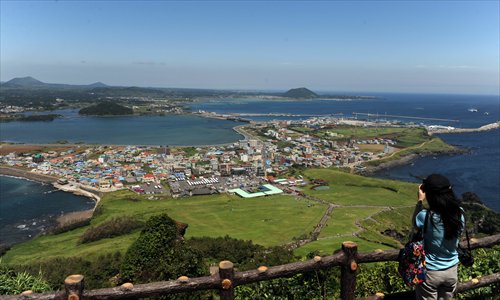Jeju u-turn
Chinese buyers facing increasing restrictions in S.Korea getaway

A woman takes a picture of South Korea's Jeju Island. Photo: IC
Monied Chinese have become the most active foreign investors on South Korea's Jeju Island, but the local government is planning to throw on the brakes.
"Property projects invested in by Chinese real estate companies in Jeju Island have been suspended," a Chinese estate agent surnamed Liu told the Global Times on Sunday.
Liu said she now only sells projects developed by South Korean companies as a way to reduce her risk.
The suspension was handed down by Won Hee-ryong, the newly elected governor of the island, who has called Chinese investment "speculative," and expressed concern that it may make Jeju a "Chinatown."
Sudden suspension
Won said recently that all projects with Chinese investors in Jeju Island that have not broken ground must be reapproved, China Business News (CBN) reported on Thursday.
Won, who took office on June 4, announced on June 17 that Jeju Island welcomes "healthy Chinese investment" but has expressed his opposition to "speculative Chinese investment," South Korean news agency Yonhap News reported on Thursday.
"If [the investment is] only for building resorts and casinos, then it is speculation rather than investment," Won said in an interview with South Korean news portal newsis.com on June 19.
Due to Won's new policy, Hong Kong-listed Chinese company Landing International Development had to postpone a theme park ground-breaking ceremony scheduled for June 24, CBN reported.
The same report noted that the theme park would be Jeju Island's largest foreign-invested project to date.
The theme park, which is scheduled to open in 2018, is expected to cost approximately $2.94 billion, according to the website of Jeju Free International City Development Center (JDC). An introduction on JDC's website describes the planned park as a world-class resort complex centered around history, culture, and mythology, both local and global.
However, the local government informed Landing's subsidiary on the island on June 20 that the area to be built upon differs from the area approved, and that the discrepancy must be corrected before August 29, CBN reported.
Landing's headquarters in Hong Kong declined to comment when contacted by the Global Times on Thursday.
But CBN noted that Landing's Jeju Island subsidiary said the company would actively cooperate with the newly elected governor, and expected that the project would soon break ground as planned.
Jin Qiangyi, director of Asia Research Center at Yanbian University in Northeast China's Jilin Province, told the Global Times Sunday that it is understandable to amend policies when a region enters a different phase in its development, but it is not proper to completely overturn approvals granted by a previous administration.
It would be wiser to pilot a new policy using projects that have not yet received approval, Jin said, noting that sudden changes may damage foreign investors' confidence in the island.
Higher standards
In addition to suspending project approvals, Won also said he will increase the threshold for foreigners to get South Korean permanent resident visa through property purchases on the island, CBN reported.
According to news portal qq.com, the island's new administration has already submitted a proposal to the South Korean government revising standards for visas obtained through property investment.
The proposal advises increasing the threshold for permanent visas from 500 million Korean won ($500,000) to 1 billion won, according to the qq.com report.
It also recommends limiting the number of foreigners on Jeju Island with permanent resident visas to no more than 1 percent of the island's total population, equal to approximately 6,000 people, the report said.
According to Chinese media reports, Chinese investors make up the majority of foreigners granted permanent visas through house purchases.
South Korean newspaper Chosun Ilbo reported in April that, as of the end of 2013, Chinese investors owned more than 3 million square meters land on Jeju Island, 60 times the amount they owned in 2010.
Surging Chinese land purchases can be partly attributed to visa policies issued by South Korean government in a bid to attract foreign investment to the island.
In December 2001, South Korea designated the island an "international free city," opening it to the gaming and real estate industries.
According to South Korea's policy, if foreign investors purchase a property worth no less than $500,000 on Jeju Island, they can get permanent resident visa after five years, according to real estate agent Liu.
An attractive buy
Liu further noted that, owing to South Korean government's rules limiting property rental and resale by foreign buyers, most Chinese buyers purchased houses on the island as leisure homes for holidays.
Jeju's attraction to Chinese buyers is strengthened by its proximity to Shanghai and visa-free entry for Chinese nationals.
Jin, the research center director, said that Chinese buyers were initially attracted by the island's beautiful natural environment, and that rising house prices have further encouraged their investment.
"Currently, average home prices on Jeju range from 25,000 yuan (approximately $4,000) to 27,000 yuan per square meter." Liu said, "[Prices] are still rising. At the beginning of this year they were only 22,000 yuan [per square meter]."
A small apartment on the island is now worth about $590,000, according to Liu.
Capital inflow from Chinese investors, including both property developers and house buyers, has caused worry among Jeju residents that Chinese investment may further push up home prices, according to Jin.
But, he said, considering the signs of recession in the Chinese real estate market and Jeju Island's rising house prices, Chinese interest in the island is likely to remain strong.